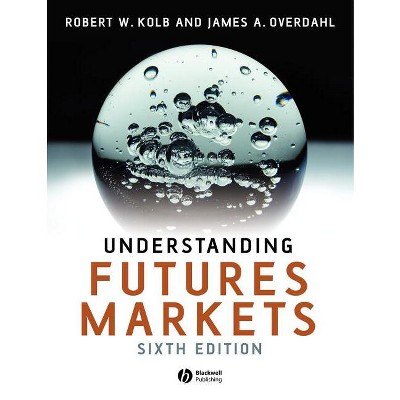Futures, Options, and Swaps - 5th Edition by Rob Quail & James A Overdahl (Hardcover)

About this item
Highlights
- A new and updated edition of the most readable, comprehensive text available on derivatives markets.
- About the Author: Robert W. Kolb holds the Frank W. Considine Chair in Applied Ethics at Loyola University Chicago.
- 848 Pages
- Business + Money Management, Finance
Description
Book Synopsis
A new and updated edition of the most readable, comprehensive text available on derivatives markets.
- Utilizes an even more applied approach than previous editions
- Provides an excellent balance between introductory and advanced topics
- Extensively updated to incorporate and explicate development in the field including the areas of electronic trading platforms, globalization of markets, hedge funds, financial scandals involving derivatives, and government regulation
- Revised to include over 50 text boxes with applied vignettes on topical issues, product profiles, and historical anecdotes
From the Back Cover
Written in an accessible, non-technical style, Futures, Options, and Swaps is the most comprehensive text on derivatives markets available. As the only book to utilize such a reader-friendly, instructive approach, students will find the material readily comprehensible without a professor's guidance, thereby freeing instructors to cover only the vital topics, or to teach a more technical course.This fifth edition has been extensively revised to address the most recent developments in this rapidly evolving field. New and updated information reflects current conditions in a variety of areas, including electronic trading platforms, globalization of markets, hedge funds, financial scandals involving derivatives, and government regulation. Also new to this edition are text boxes containing anecdotes or vignettes related to topics discussed more formally in the text, and product profiles to describe some of the more successful contracts around the world and to highlight innovative or unusual features of traded contracts. The treatment in this text emphasizes financial derivatives, but it does not neglect traditional commodity futures.
An accompanying website can be found online at www.blackwellpublishing.com/kolb, containing the OPTION! program that allows the user to compute virtually every option and swap value discussed in this book, as well as many of the relationships among different option prices. The website also includes more than 80 exercises designed to enhance the understanding of option pricing principles and applications.
Review Quotes
"This is a revision of an already excellent textbook that has a very clear way of explaining the often difficult concepts that the student needs to understand in this very technical subject area. What I particularly like is the careful way the text builds up the material in a simple style without skipping any steps. This incremental approach makes it a very useful teaching resource. The book clearly knows what it is trying to do and makes no assumption about the knowledge level of the reader. I also like the way material is presented through the use of concrete examples."
Peter Moles, University of Edinburgh
About the Author
Robert W. Kolb holds the Frank W. Considine Chair in Applied Ethics at Loyola University Chicago. He was formerly Assistant Dean for Business and Society (2003-2006) at the University of Colorado, and John S. and James L. Knight Professor of Finance at the University of Miami. He is author and co-author of numerous texts in finance, including Futures, Options, and Swaps, 5e (with James A. Overdahl, Blackwell, 2007) and Understanding Futures Markets, 6e (with James A. Overdahl, Blackwell, 2006).James A. Overdahl is Chief Economist at the Commodity Futures Trading Commission in Washington, D.C., and has held senior positions at the Risk Analysis Division at the Office of the Comptroller of the Currency and at the Securities and Exchange Commission. He has been an adjunct professor of finance at Georgetown University, the University of Maryland, George Washington University, and Johns Hopkins University.
Shipping details
Return details
Trending Non-Fiction











